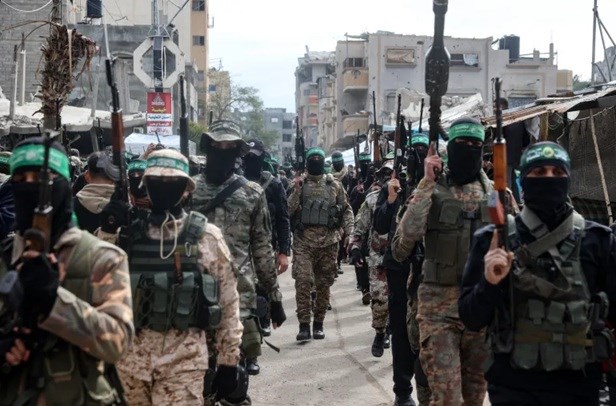
Sunday August 3, 2025

Palestinian fighters from Hamas’s armed wing, the Qassam Brigades, at a funeral ceremony on February 7, 2025 [File: Eyad Baba/AFP]
Mogadishu (HOL) — Hamas has denied claims made by a U.S. official that the group is willing to disarm, insisting it will not relinquish its weapons until a sovereign Palestinian state with Jerusalem as its capital is established, as Gaza’s starvation crisis continues to intensify.
The group’s statement on Saturday came after U.S. envoy Steve Witkoff reportedly told families of Israeli captives that Hamas was “prepared to be demilitarised.” Hamas rejected the claim as false and politically motivated.
“The resistance and its weapons are a national and legal right as long as the [Israeli] occupation persists,” the group said. “That right cannot be relinquished until our full national rights are restored, foremost among them the establishment of a sovereign Palestinian state with Jerusalem as its capital.”
Witkoff met with Israeli families in Tel Aviv on Saturday, a day after visiting an aid distribution site in Gaza run by the U.S.- and Israeli-backed Gaza Humanitarian Foundation (GHF), a group whose operations have come under sharp international criticism.
According to the UN, more than 1,300 Palestinians have died attempting to access food from GHF-run distribution points since the group began operating in May. Human rights organizations accuse Israel of using starvation as a weapon of war.
GHF, operating with little coordination from the U.N., placed its sites in high-risk areas. Legal expert Neve Gordon compared the scenes to a “Hunger Games” scenario, accusing the group of famine profiteering and giving Israel cover for continued military operations.
Despite the criticism, the U.S. has stood by GHF. In June, Washington pledged $30 million in support for the organization.
Meanwhile, the humanitarian crisis in Gaza is worsening. The Gaza Health Ministry reported that at least 175 Palestinians, including 93 children, have died from starvation-related causes. Aid agencies say that only a fraction of the necessary aid is entering the enclave.
Hospitals have reported children dying from hunger, and civilians being shot near food distribution points. Human rights organizations have accused Israel of using starvation as a weapon of war, while the U.N. and aid groups say airdrops and limited truck convoys are grossly inadequate.
The crisis has drawn global condemnation. The United Nations said that one million women and girls in Gaza are starving. France, Germany, and the European Union have all urged Israel to allow unrestricted humanitarian access.
Indirect negotiations between Hamas and Israel for a 60-day ceasefire and hostage exchange broke down last week. Hamas insists any agreement must include international recognition of Palestinian statehood and an end to the blockade on Gaza, in place since 2007.
In a separate development, Israeli National Security Minister Itamar Ben-Gvir visited the Al-Aqsa Mosque compound in Jerusalem, drawing condemnation from Jordan, the Palestinian Authority, and Hamas. The site, Islam’s third holiest, is administered by Jordan and governed by a longstanding arrangement that limits non-Muslim prayer.
Ben-Gvir’s visit was seen as a provocation that could further inflame tensions in the region. Hamas labelled it “an escalation of aggression,” while Jordan’s foreign ministry said the action violated international law and “fueled the conflict.”
The visit coincided with statements from Israeli Defence Minister Israel Katz, who said Israel would “strengthen sovereignty” over Jerusalem and the Al-Aqsa compound, which Jews refer to as the Temple Mount.
Israeli officials have continued to push for renewed sovereignty claims over Gaza, while Hamas has reiterated its refusal to disarm or yield authority without international recognition of Palestinian statehood.
“Ending our armed resistance requires ending the occupation, not false promises or humanitarian theatre,” Hamas said, referring to Witkoff’s visit.
Calls are mounting for international accountability over Israel’s conduct in Gaza. A report by Action on Armed Violence found that 88 percent of Israeli military probes into alleged war crimes have stalled without findings.
Several countries have hinted at recognizing a Palestinian state if Israel fails to meet humanitarian obligations. The United Kingdom and Canada announced that they may follow France in extending formal recognition by September.
As aid trucks continue to be blocked or attacked, Palestinians in Gaza have turned to bartering to survive, trading bread for haircuts and sugar for medicine. “It’s not just about what you can buy,” one resident said, “it’s about what you can live without.”






